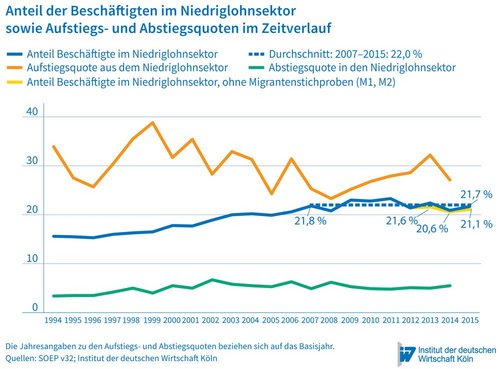The debate on distributive justice in Germany can become very heated. When this happens, the trigger is usually inequality indicators, which generally reflect only a temporary situation.

Once Down: Always Down? Empirical Findings on Wage and Income Mobility in Germany

The debate on distributive justice in Germany can become very heated. When this happens, the trigger is usually inequality indicators, which generally reflect only a temporary situation.
In view of this, it is important to pay equal attention to indicators of social mobility, since where there are opportunities for social advancement, and particularly advancement from the lower strata of society, greater inequality need not be regarded as such a serious problem. Empirical results based on the Socio-Economic Panel show that it is indeed possible to climb out of the low-wage sector: over a quarter of low wage earners manage to rise above the low wage threshold. While the proportion of those upwardly mobile was in decline until approximately 2008, it has since then been gradually rising. There is only a limited connection between mobility out of the low-wage sector and the risk of poverty. About one third of those at risk of poverty manage to break out of the lowest income bracket within a year, while as many as 58 per cent succeed over a ten-year period. However, when it comes to income mobility, which takes into account not only earnings but also other sources of income, there is no sign of a positive development in the frequency of advancement. Given this fact, it is first of all essential to observe how mobility develops in the wake of such factors as the influx of refugees and the introduction of the minimum wage. Secondly, there is a need for further research into the reasons behind the developments observed.
More on the topic

The 9th IW Survey of Further Training
In 2016 some 85 per cent of companies in Germany were active in continuing vocational training, using a broad mix of methods.
IW
Has the German Economy Reached its Limit?: Skilled Labour Shortages as a Brake on Growth
The German economy is performing significantly better than was expected in the first few months of this year. During the course of 2017, certain early fears – especially of a weakening of the global economy due to increasing protectionism – have proved ...
IW